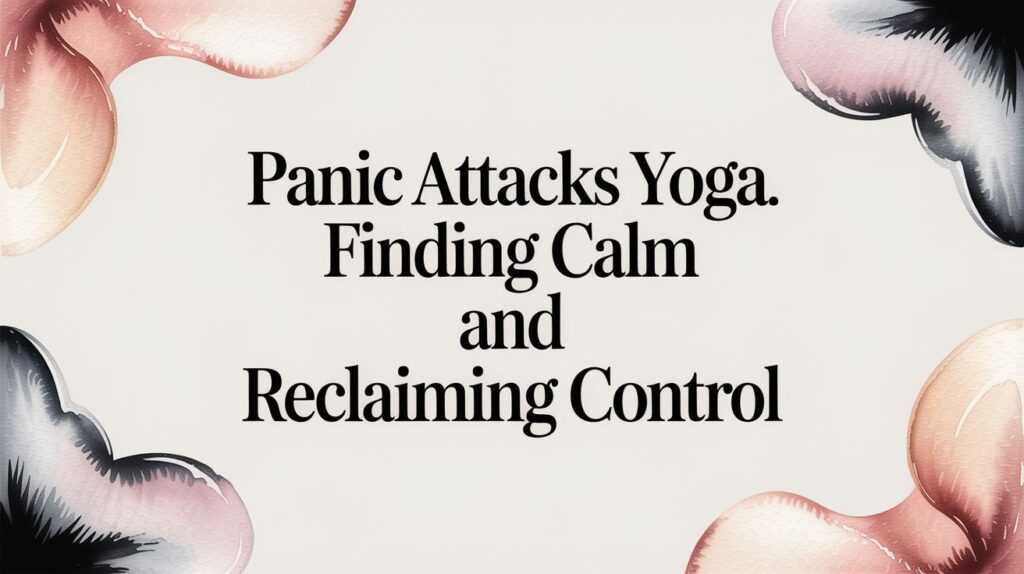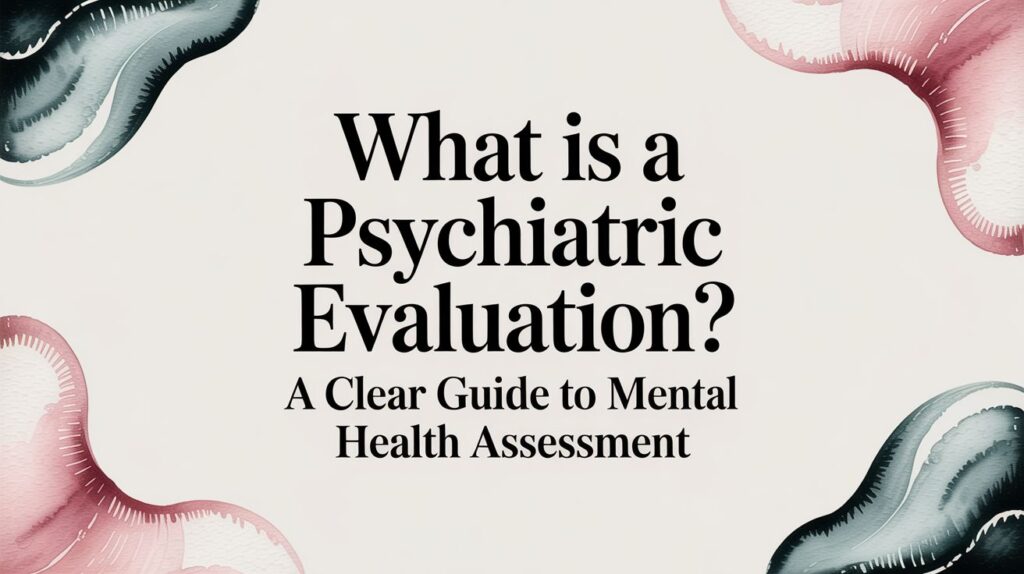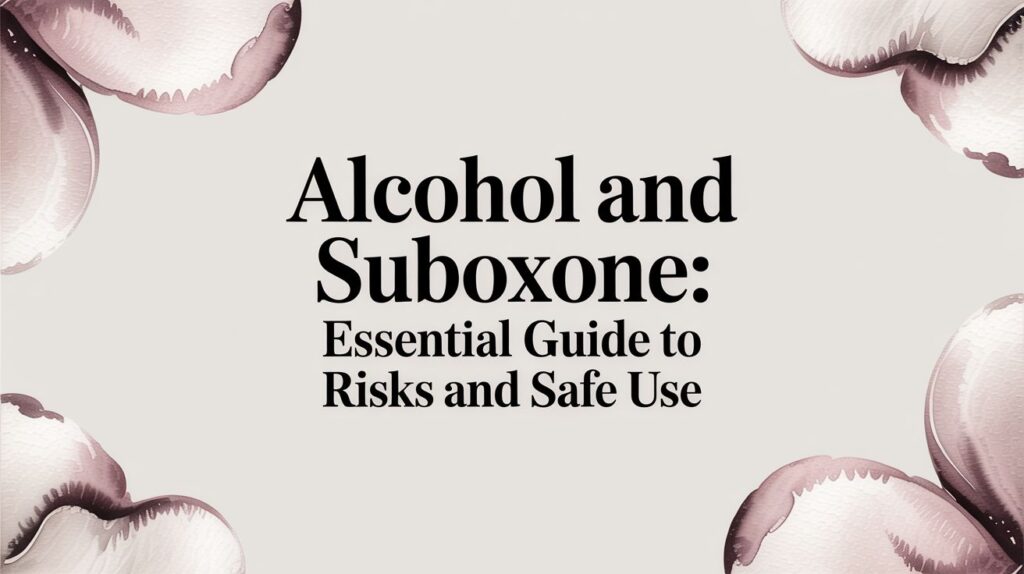Before you can figure out how to help an alcoholic husband, you first have to get clear on what you're seeing. It’s easy to second-guess yourself, wondering if you're overreacting or just being too sensitive. But that nagging feeling in your gut is often the first real sign that his drinking has crossed a line.
This isn't about looking for stereotypes. It’s about noticing the small, subtle shifts that signal a much deeper problem is taking hold.
Understanding the Signs of Alcoholism in Your Husband

Trust your instincts. If something feels wrong, it probably is. The key is to understand that alcohol use disorder is a legitimate health condition, not a moral failing or a simple lack of willpower. Recognizing this fact is a crucial first step because it moves you away from blame and toward finding a real solution.
You are not alone in this. Alcoholism is a massive public health issue that tears families apart all over the world. In 2019 alone, alcohol was linked to roughly 2.6 million deaths globally, with men making up 2 million of those. This isn't just a personal struggle; it's a global crisis, which you can read more about on the World Health Organization's website. Those numbers underscore how urgent it is to face this head-on.
Behavioral vs. Physical Signs
Alcoholism doesn’t always look the same. Some men, often called high-functioning alcoholics, manage to keep their jobs and social lives intact, which can make the problem harder to spot. They hide it well. This is why it’s so important to distinguish between the behavioral red flags and the physical changes, as both tell part of the story.
To help you get a clearer picture, here’s a breakdown of the kinds of signs you might be seeing.
| Behavioral vs. Physical Signs of Alcoholism |
| :— | :— |
| Category of Sign | Specific Examples to Look For |
| Behavioral Signs | • Hiding alcohol around the house or being secretive about how much he’s drinking.
• Becoming defensive, irritable, or angry if you bring up his drinking.
• Dropping the ball on responsibilities at work, with the kids, or around the house.
• Losing interest in hobbies and activities that used to bring him joy. |
| Physical Signs | • Seeming constantly tired, having trouble sleeping, or complaining about insomnia.
• Gaining or losing weight without a clear reason.
• Shaky hands, especially in the morning before he has a drink.
• A persistently red or flushed face, or broken blood vessels on his nose. |
Looking at this list, you can probably see how these signs often start small and then build over time. It might have begun with just one drink after work to unwind, but that slowly turned into a nightly necessity. Maybe you’ve noticed he’s started finding more and more excuses to drink—celebrating tiny wins, coping with minor daily stresses, or just "relaxing."
The hardest part is often just admitting to yourself what’s really happening. Your husband is almost certainly in denial, but your ability to see these signs clearly—without making excuses for him—is the single most important step toward taking meaningful action.
Your goal here isn't to become a doctor and diagnose him. It’s about gathering your observations to confirm that your concerns are valid. That clarity will give you the strength to approach him thoughtfully and find the right support for both of you.
How to Start the Conversation About His Drinking
Talking to your husband about his drinking feels like walking on eggshells. You know you have to do it, but every instinct screams that it could blow up in your face. Will he get angry? Shut down completely? Twist it around and blame you?
These fears are completely normal. But leaving the elephant in the room to grow bigger isn't an option. The key is to reframe the goal. This isn't a confrontation or an intervention where you demand a confession. It’s a quiet, heartfelt attempt to open a door he might have sealed shut.
Timing and location are half the battle. The absolute worst time to bring this up is when he’s drinking, buzzed, or nursing a hangover. That’s a recipe for defensiveness and irrational arguments.
Instead, find a pocket of calm when you’re both sober, rested, and won’t be interrupted. Think of it like a business meeting for your marriage—you wouldn't schedule it in the middle of a crisis. A quiet Saturday morning over coffee often works far better than a tense Tuesday night after a draining workday.
Choosing Your Words Carefully
The language you use can either build a bridge or a wall. Your goal is to help him see how his drinking is impacting you and your life together, without making him feel cornered or shamed.
This is where "I" statements become your most powerful tool. It’s a simple shift in phrasing that changes everything.
Instead of an accusation like, "You're always drunk, and you're ruining our family," try framing it from your experience.
- "I feel scared when you get behind the wheel after having a few drinks."
- "I feel so lonely at night when you're drinking and we don't connect anymore."
- "I miss the way we used to talk before drinking became part of every evening."
This approach isn’t about blaming him; it's about sharing your reality. It's much harder for someone to argue with how you feel than it is to deny an accusation.
The goal is not to force a confession or win an argument. It's to plant a seed of awareness by sharing how his behavior is affecting you and your relationship.
Prepare for His Reaction
His response might not be what you’re hoping for, and you need to steel yourself for that possibility. Denial is the bedrock of addiction; he may genuinely believe he doesn’t have a problem.
Here are a few common reactions and how you can navigate them:
- Denial or Minimizing: He might fire back with, "It's not that bad," or the classic, "I can stop anytime I want." A calm, steady response works best here. "I hear you, and I understand that's how you see it. From my perspective, I'm worried because I've noticed…" and then share a specific, factual example without emotion.
- Anger and Defensiveness: If his voice rises and he gets angry, do not take the bait. Your goal isn't to win a fight. You can say, "I'm not trying to attack you. I'm bringing this up because I love you and I'm worried." If things escalate, it's perfectly fine to hit pause. "This isn't productive right now. Let's talk about this later when we're both calmer."
- Surprising Openness: Sometimes, on a deeper level, he knows there's a problem and is relieved you finally said something. If he shows even a flicker of willingness to listen, acknowledge how much courage that takes. You can gently suggest exploring what getting help might look like together.
This first conversation is rarely the last one. Think of it as the beginning of a much longer process. Your only objective right now is to break the silence and make it clear you’re coming from a place of love and deep concern for him and for the future of your family.
Setting Boundaries to Protect Your Own Well-Being
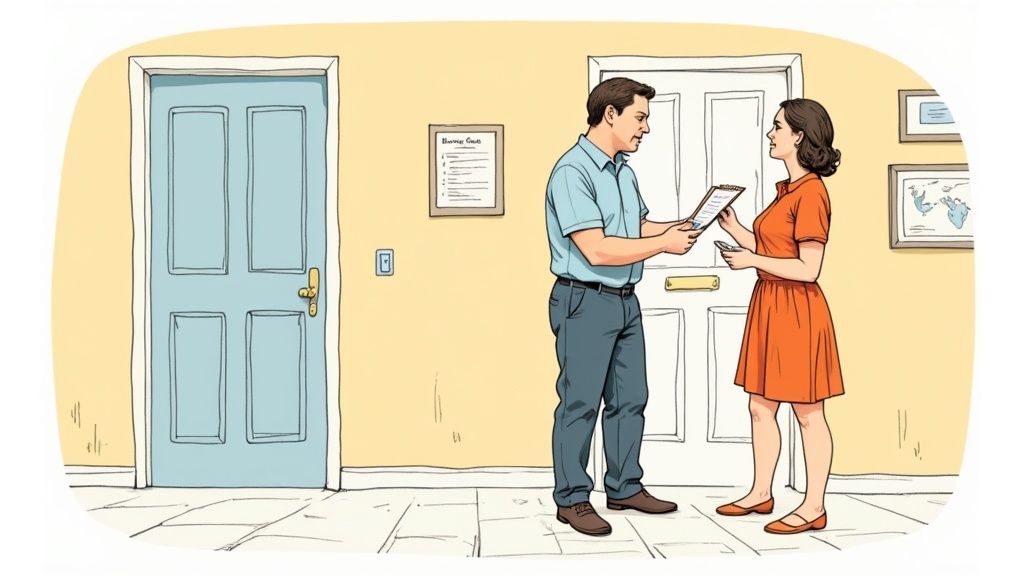
If you're trying to figure out how to help an alcoholic husband, you know the exhausting cycle of crisis management and broken promises. This is where you stop feeling helpless and start getting empowered. Setting healthy boundaries isn’t about punishment; it’s an act of self-preservation that can also be the very thing that sparks his desire for change.
Think of boundaries as your non-negotiables. They are the clear lines you draw to protect your sanity, your safety, and the peace of your home. Without them, you risk becoming an enabler—unintentionally shielding him from the consequences that might finally motivate him to get help.
What Healthy Boundaries Look Like in Practice
Real boundaries aren't threats or dramatic ultimatums. They're calm, clear statements about what you will and won't accept from this point forward.
Here are a few practical examples of what this sounds like:
- "I will not lie to your boss or our family to cover for you anymore." This removes you from the web of deception that addiction needs to survive.
- "I will no longer give you money if I suspect it will be used for alcohol." This directly addresses the financial strain and stops you from funding the problem.
- "You are not welcome to sleep in our bed if you come home drunk." This creates an immediate consequence for his drinking while protecting your personal space.
Putting these limits into practice feels incredibly unnatural at first, especially if you’re used to picking up the pieces. You will almost certainly feel a wave of guilt. It's critical to remember that your well-being matters just as much as his. Our guide on setting boundaries in recovery offers more detailed strategies for this process.
Communicating and Sticking to Your Limits
The secret to making boundaries work is clear communication and unwavering consistency. Pick a time when he is sober to calmly and firmly state your new rules. Explain that you are doing this because you love him and yourself, not because you're trying to control him.
He might react with anger, blame, or manipulation. You have to hold your ground. Every time you give in, you teach him that your boundaries aren’t serious. This is the hardest part, but it's also the most important.
"Your boundaries are not there to control your husband's behavior. They are there to protect your own mental and emotional health. You are reclaiming your power by defining what is acceptable in your life."
This distinction is vital. It also helps to understand the broader context of alcohol addiction, which often follows gender-specific patterns. Globally, men have significantly higher rates of alcohol use disorders. In Mongolia, a country with high prevalence, 8.41% of men are affected compared to just 1.9% of women. Knowing that men are statistically more vulnerable can help you approach the situation with greater insight.
Ultimately, setting boundaries is about saving yourself first. You can’t force him to change, but you can change how you respond to his drinking. This creates a new dynamic where he is forced to confront the reality of his addiction—and that is often the first real step toward recovery.
Navigating Professional Treatment And Recovery Options
When your husband finally agrees to get help, the relief you feel can quickly turn into overwhelm. The world of addiction treatment is full of jargon and different programs, and it's tough to know where to even start. Your job isn't to be his therapist, but having a handle on the landscape will empower you to guide him toward the right kind of support.
The first step is often medical detox. This is a critical safety measure where medical professionals help manage the physical symptoms of alcohol withdrawal, which can be dangerous and even life-threatening if done alone. Think of it as the necessary first step to stabilize his body so his mind can begin to heal.
Understanding The Levels Of Care
From detox, the path can branch out depending on how much support he needs.
Residential rehab is what most people picture when they think of treatment. It’s an immersive, 24/7 structured program where he lives at the facility, away from daily triggers and distractions. This is often the best choice for someone with a severe addiction, as it allows for a total focus on getting better.
On the other hand, outpatient programs offer more flexibility. An Intensive Outpatient Program (IOP), for example, involves several hours of therapy a few days a week, but he gets to live at home. This can work well for someone with a strong support system (that’s you!) and a less severe addiction, allowing them to keep up with work or family life.
- Detoxification: The medically supervised first step to safely manage withdrawal. It’s non-negotiable for anyone with a significant physical dependence.
- Residential Treatment: Inpatient care that provides around-the-clock support and therapy in a substance-free environment.
- Outpatient Treatment (IOP/PHP): Structured therapy sessions that allow him to live at home, striking a balance between recovery and daily responsibilities.
- Support Groups: Peer-led groups like Alcoholics Anonymous (AA) that provide a free, long-term community for accountability and shared experience.
This visual really drives home how much time and energy addiction steals—time that could be spent on family, hobbies, and health. It’s a powerful reminder of what he stands to gain by seeking help.
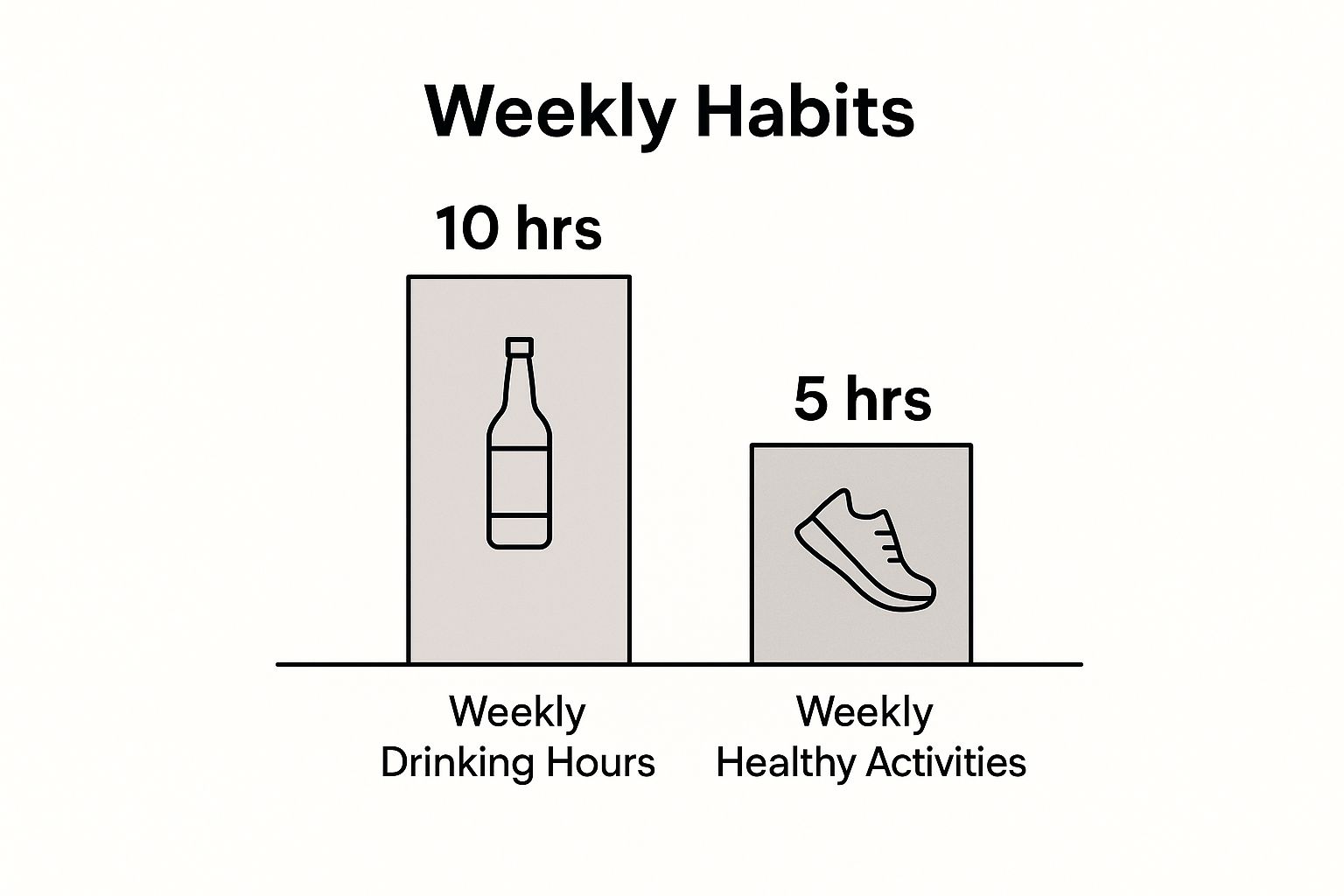
Looking at it this way, you can see how recovery isn't just about stopping drinking; it's about reclaiming a life that's been put on hold.
To help you compare the main options at a glance, here’s a quick breakdown:
Comparing Alcoholism Treatment Approaches
Navigating the different types of addiction treatment can be confusing. The right fit depends on the severity of the addiction, the stability of the home environment, and the individual's specific needs. This table summarizes the most common modalities to help clarify which path might be most appropriate.
| Treatment Type | Best For | Key Features |
|---|---|---|
| Medical Detox | Individuals with physical dependence on alcohol who are at risk for severe withdrawal. | 24/7 medical supervision; Medication to manage symptoms; Short-term (3-10 days). |
| Residential Rehab | Severe alcohol use disorder; Unstable or triggering home environment; Co-occurring mental health issues. | Live-in facility; Highly structured daily schedule; Individual, group, and family therapy. |
| Outpatient (IOP/PHP) | Moderate SUD; Strong home support system; Need to maintain work or school. | Attend treatment several hours a day, multiple days a week; Live at home; Learn skills in a real-world context. |
| Support Groups (AA) | Long-term maintenance and community; Individuals seeking peer support and accountability. | Peer-led meetings; 12-Step framework; Free and widely available. |
Ultimately, the goal is to find a program that provides the right level of structure and support to build a strong foundation for lasting recovery.
Presenting Options Collaboratively
How you bring these options to him is just as important as the options themselves. Frame it as a team effort: "Let's look at these places together." Do a little homework beforehand and have a few reputable centers in mind. Presenting a few solid choices shows you're serious and makes the task feel less overwhelming for him.
Remember, the goal is to guide, not to force. He has to be an active participant in his own recovery for it to stick.
Your support during this phase is invaluable. Offer to make the initial phone calls, help sort through insurance paperwork, or go with him to an initial consultation. These actions show you’re not just telling him what to do—you’re walking the path with him. As you move forward, learning more about how to support someone in recovery will give you practical tools to be an effective partner on this journey. Helping him connect with professional care is one of the most powerful and loving things you can do.
Finding Support for Yourself on This Difficult Journey

There’s a reason people say you can’t pour from an empty cup. It’s a simple phrase, but one that’s easy to forget when you’re completely wrapped up in trying to help an alcoholic husband. Your world shrinks until it’s all about him—his moods, his choices, his well-being.
But this journey takes a massive toll on you. Prioritizing your own mental and emotional health isn’t selfish; it’s a non-negotiable survival strategy.
The chronic stress of living with an alcoholic partner is corrosive. Research has shown time and again that spouses often face heightened anxiety, depression, and even symptoms of trauma. You might be exhausted from sleepless nights, constantly walking on eggshells, and putting your own needs on the back burner indefinitely. Seeing this impact for what it is becomes the first step toward reclaiming your own life.
Why You Need Your Own Support System
You simply cannot do this alone. Trying to manage the chaos in isolation is a fast track to burnout and despair. Building a support system is about carving out a safe space where you can be brutally honest about your struggles without facing judgment.
This is where groups designed specifically for the families of alcoholics can be an absolute lifeline. They offer a level of understanding that even the most well-meaning friends or family members often can't provide.
- Al-Anon Family Groups: This is a fellowship of relatives and friends of alcoholics who share their experience, strength, and hope. It’s a place to internalize the crucial truth that you are not responsible for your husband’s drinking and that you have choices.
- Individual Therapy: A good therapist can give you personalized tools to navigate codependency, manage anxiety, and reinforce the healthy boundaries you’re trying to set. It’s a completely private space to process your feelings.
- Online Communities: If getting to in-person meetings is a challenge, countless online forums and support groups offer connection and the comfort of anonymity.
"The most significant issue you will face in all of this is not helping the one with alcoholism… it is you who is affected."
This powerful reminder cuts to the heart of the matter: your healing is just as critical as his. You've been living with the fallout of his disease, and that requires its own kind of recovery. Learning to detach with love—caring for him without carrying the crushing weight of his addiction—is a skill you can learn with the right support.
Taking Action for Your Own Well-Being
Finding support isn’t a passive wish; it’s an active choice you make to invest in your own future. For many, exploring different peer support options is a fantastic first move. You can get a clearer picture in our detailed guide on https://alturarecovery.com/blog/support-groups-for-spouses-of-alcoholics to see what might be the best fit for you.
Remember, your well-being cannot be dependent on his sobriety. By seeking help for yourself, you are modeling healthy behavior and building the resilience you'll need to handle whatever comes next. Whether he ultimately chooses recovery or not, you can choose to heal and create a life of peace and stability for yourself.
Answering Your Most Difficult Questions
Navigating this path brings up heavy, complex questions—the kind that keep you up at night. While there are no simple fixes, getting clear, direct information can give you a sense of direction when everything else feels uncertain. Let's walk through some of the most common and gut-wrenching questions spouses face.
What if He Refuses to Admit He Has a Problem?
Denial is one of the most powerful symptoms of addiction. It’s a brick wall. If your husband refuses to acknowledge his drinking is a problem, arguing is a dead end. It will only lead to more conflict and push him further away.
The most effective strategy is to shift your focus from his denial to your own actions. This is where your boundaries become critical. Stop making excuses for him, shielding him from consequences, or cleaning up his messes. When he experiences the natural fallout from his drinking—a missed work deadline, a ruined family event, a financial crisis—it becomes much harder for him to deny the impact. For many, reality is the only thing that can create a crack in that wall of denial.
Can I Legally Force My Husband into Rehab?
This is a question born from sheer desperation, but the answer is incredibly complex and varies from state to state. Most areas have laws, often called civil commitment or involuntary commitment statutes, that allow for this, but the bar is extremely high. You typically have to prove in court that he is an immediate danger to himself or others because of his drinking.
This is a legal process that should be treated as an absolute last resort. It's often traumatic for everyone involved and can severely damage trust. Your best first step is to consult with a professional interventionist or an attorney who specializes in this area. They can explain the specific requirements where you live and help you understand if this is even a viable option.
Your role is to support his recovery, not control his decisions. While a relapse feels like a massive step backward, how it's handled can determine whether it's a brief stumble or a full return to active addiction.
How Do I Handle a Relapse After Treatment?
It’s devastating when he relapses after making progress. It can feel like all that hard work was for nothing. But it's vital to understand that relapse doesn't mean failure. Recovery is rarely a straight line.
Your first move? Stay calm. Avoid blame, shame, or "I told you so's," as this will only push him further into the addiction. Reaffirm your boundaries immediately. You support his recovery, not his drinking. Encourage him to contact his sponsor, therapist, or treatment center right away. The goal is for him to take ownership of the slip-up and get back on his recovery path as quickly as possible. You can find more advice on this in our guide to navigating recovery and relationships.
How Should I Explain His Alcoholism to Our Children?
Be honest, but in an age-appropriate way. Use simple, direct language. You can explain that their dad has an illness that sometimes makes him act differently, and—this is crucial—that it is never their fault. Reassure them constantly that they are loved and safe.
A helpful framework from Alateen is the "Three Cs": they didn't cause it, they can't control it, and they can't cure it. Creating an open, safe space for them to ask questions and share their feelings is the most important thing you can do to protect their well-being through this.
At Altura Recovery, we understand the immense challenges families face. Our outpatient programs provide the expert care and flexible support needed for real, sustainable healing. If you're ready to take the next step, contact us at https://www.alturarecovery.com.



